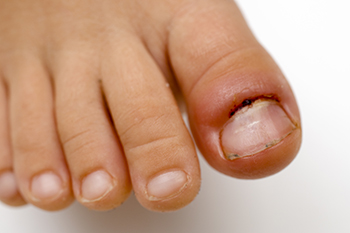
(908) 381-8160Berkeley Heights

Having an abscess on the toe can be a painful and annoying experience. A toe abscess may be caused by germs or oil in the toe, a hair follicle, or a skin puncture. An abscess is a sign of infection causing the sore to fill with pus and other fluids. Inflammation sets in, and the toe becomes red and painful to the touch. Ignoring a toe abscess can lead to more serious infections within the entire body. Before a podiatrist can treat an abscess, certain information is needed, including how long the abscess has been there and whether the toe was injured. If the abscess is advanced, the podiatrist will proceed to make a small cut to drain it, and then will flush the area with an antiseptic solution. A bandage will be applied to guard against further infection, and pain medication may be prescribed. One way to prevent another toe abscess is to maintain daily foot hygiene habits. For more information on wound care for a toe abscess, it is suggested that you make an appointment with a podiatrist.
Wound care is an important part in dealing with diabetes. If you have diabetes and a foot wound or would like more information about wound care for diabetics, consult with Dr. Janet Leicht from New Jersey. Our doctor will assess your condition and provide you with quality foot and ankle treatment.
What Is Wound Care?
Wound care is the practice of taking proper care of a wound. This can range from the smallest to the largest of wounds. While everyone can benefit from proper wound care, it is much more important for diabetics. Diabetics often suffer from poor blood circulation which causes wounds to heal much slower than they would in a non-diabetic.
What Is the Importance of Wound Care?
While it may not seem apparent with small ulcers on the foot, for diabetics, any size ulcer can become infected. Diabetics often also suffer from neuropathy, or nerve loss. This means they might not even feel when they have an ulcer on their foot. If the wound becomes severely infected, amputation may be necessary. Therefore, it is of the upmost importance to properly care for any and all foot wounds.
How to Care for Wounds
The best way to care for foot wounds is to prevent them. For diabetics, this means daily inspections of the feet for any signs of abnormalities or ulcers. It is also recommended to see a podiatrist several times a year for a foot inspection. If you do have an ulcer, run the wound under water to clear dirt from the wound; then apply antibiotic ointment to the wound and cover with a bandage. Bandages should be changed daily and keeping pressure off the wound is smart. It is advised to see a podiatrist, who can keep an eye on it.
If you have any questions, please feel free to contact our office located in Berkeley Heights, NJ . We offer the newest diagnostic and treatment technologies for all your foot care needs.